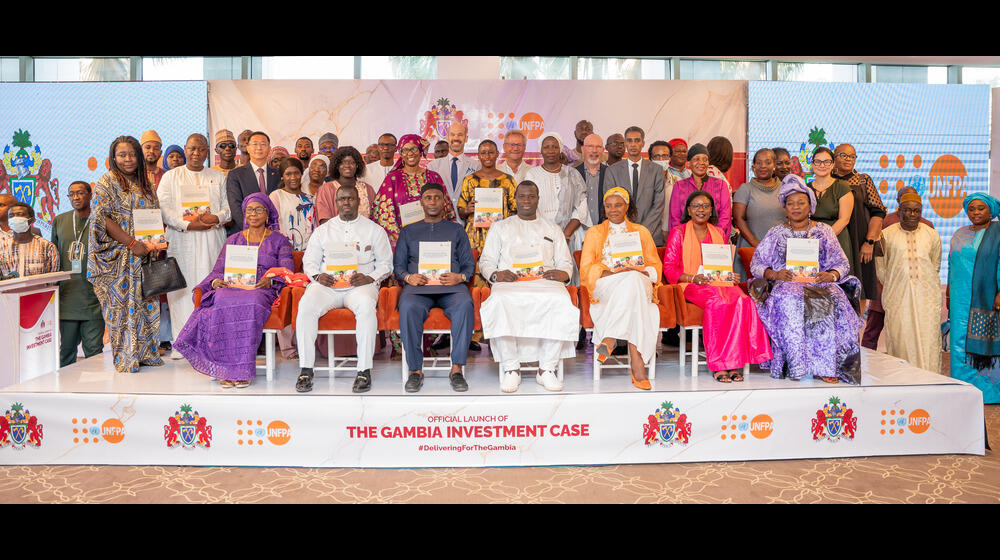On Friday, October 20th, 2023, the United Nations Population Fund in collaboration with the government of The Gambia launched The Gambia Investment Case on Sexual and Reproductive Health. The event brought together government officials, civil society representatives, and other partners. The launch marks a significant milestone in the on-going mission to enhance the sexual and reproductive health of women and girls in The Gambia.
About The Gambia Investment Case
The Gambia Investment Case is a comprehensive and strategic document that outlines compelling evidence of the need to invest in sexual and reproductive health of women and girls in The Gambia. Through the Case, UNFPA The Gambia and the government seek to address:
- The unmet need for family planning
- Preventable maternal deaths
- Gender based violence including child marriage and FGM.
The launch of the Investment Case featured key speakers who commended the initiative for its potential to transform the country's health landscape especially for women and girls. They emphasized that the launch marks the beginning of a collaborative effort to prioritize sexual and reproductive health in The Gambia, representing an important milestone towards achieving the Sustainable Development Goals (SDGs), notably SDG 3 regarding Good Health and Well-being and SDG 5 concerning Gender Equality.
The UNFPA Country Representative Ms. Ndeye Rose Sarr underscored the importance of allocating resources to invest in sexual and reproductive health. She also called on stakeholders and partners to unite in their efforts to improve wellbeing of women and girls in the country.
“….I want to emphasize the critical importance of government and donor investment in these cases. We need all hands on deck to bridge the needed funding gap especially in the face of global financial crises induced by COVID-19 and the Ukraine war. Investing in sexual and reproductive health, family planning and gender equality are not just moral imperatives, but essential to well-being, prosperity and development of any country. Without these services, individuals, particularly women and girls are at risk of unintended pregnancies, unsafe abortion and harmful practices that limit their potential.” Ms. Rose Sarr said at the launch.
Ms. Sarr expressed gratitude to the government and partners for their unwavering commitment to addressing urgent concerns such as maternal mortality, family planning, and gender-based violence in The Gambia.
The UN Resident Coordinator in The Gambia, Ms. Seraphine Wakana reaffirmed the UN’s commitment to supporting the government of the Gambia through its United Nations Sustainable Development Framework, aligning with the country’s national development plan priorities. She further stated.
“Through this framework, we will continue to strengthen partnerships and work together for the fulfillment of every single Gambian, ensuring no single person is left behind.”
Officially launching the Gambia Investment case, Baboucarr Boye, Minister of Public Service and the representative of HE the Vice President of The Gambia, reaffirmed government’s commitment to promoting women’s access to sexual and reproductive health services. He commended the UNFPA for its prominent role in championing the wellbeing of women, girls and young people of The Gambia.
Key findings of The Gambia Investment Case
The report identifies three key findings and recommendations:
1. Maternal Mortality: The Investment Case reveals that maternal mortality remains high in the Gambia although it has sharply declined from 433/100,000 in2013 to 289/100,000 in 2019. To address preventable maternal death, the report recommends increased funding for maternal health programs, training and equipping of healthcare personnel and strengthening health systems to ensure quality care for expectant mothers. A proposed investment of USD 38 million could reduce the Maternal Mortality Ratio (MMR) from 289 to 141 per 100,000 live births by 2030, a 51% decrease from the 2022 baseline.
2. Family Planning: Access to family planning services is essential for the well-being of women and families. There is a significant unmet need for family planning services in Gambia which is currently 24%. To address this challenge, the investment case report recommends expanding access to various family planning methods (currently 10 methods exist and should be increased to 13 methods), enhancing comprehensive health education and awareness, and community involvement. An investment of USD 3.2 million could increase the Contraceptive Prevalence Rate (CPR) from 19% to 30% by 2030, preventing 350,000 unintended pregnancies.
3. Harmful Practices: The investment case report highlights the prevalence of harmful practices and gender-based violence in Gambia. Based on this, the report recommends comprehensive prevention programs, support for survivors of GBV, and suggests legislative reforms and access to justice for survivors. An investment of USD 10 million could prevent 152,558 cases of Female Genital Mutilation/Cutting (FGM/C) over eight years. Additionally, an investment of US$25.8 million could prevent 36,448 child marriages between 2022 and 2030.
UNFPA Gambia urges all stakeholders to support and implement the Investment Case ensuring the preservation of sexual and reproductive health and rights of every Gambians. As the document paves the way for transformation, it is anticipated that improved health outcomes and increased r gender equality will bring about a brighter future for the people of The Gambia, with particular focus on women and girls.
To learn more about the Gambia Investment Case on Sexual and Reproductive Health and how you can get involved, visit: https://unf.pa/3Fqy2uN
Media contact: Fatoumatta Cham, Program Analyst-Communications (fcham@unfpa.org)


